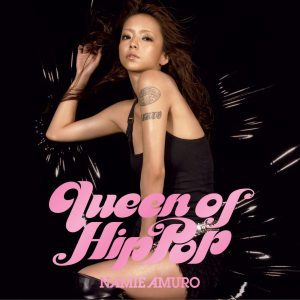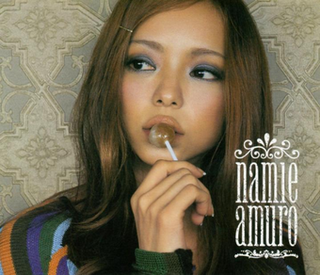
Namie Amuro is a retired Japanese singer. She rose to prominence as a teen idol, and transitioned into a leading pop artist due to her versatility across music styles and visual presentation. Due to her career reinventions and longevity, she is known as an icon across Japan and Asia. She has been referred to as the "Queen of Japanese Pop", and her influence domestically has drawn equivalent comparisons to artists such as Janet Jackson and Madonna in Western pop culture.

Queen of Hip-Pop is the seventh studio album by Japanese recording artist Namie Amuro. It was released on July 13, 2005, by Avex Trax. The album's lyrical content, composing and arrangement was handled by multiple music collaborators, such as Nao'ymt, SUGI-V, Michico, Tricky Stewart, T.Kura, among many others. It is her second full length urban contemporary record, and is made up of songs of various musical genres. Amuro uses the term "hip-pop" to describe the music on the album because it fuses pop music with other genres including R&B and hip-hop music. Three different formats were released to promote the album: a standalone CD, a limited edition Playbutton, and digital download.

Love Enhanced Single Collection is the second greatest hits album by Japanese singer Namie Amuro. It was released on March 13, 2002, through Avex Trax. This was Amuro's first greatest hits album in about four years, since 181920. It was also her first greatest hits album since her return to the music scene. Although the album is labeled as a "singles collection," nearly all of the songs on the album have been re-recorded, re-mixed, or re-arranged, all of which remain exclusive to this album's release. In addition, only "lovin' it" was recorded as a single take. The album also contains the last of the work she created with her longtime creative partner Tetsuya Komuro.

Concentration 20 is the third studio album by Japanese singer Namie Amuro. It was released on July 24, 1997, by Avex Trax. The album's genre is a fusion of styles including pop, dance, rock, reggae and ska. Unlike Amuro's previous effort, Sweet 19 Blues, which primarily had lyrics written by Tetsuya Komuro, Concentration 20's lyrics were mostly written by Marc Panther. Komuro did, however, compose and arrange most of the album's songs and wrote the lyrics to three of them. It was Namie's second solo album since splitting up with Super Monkey's.

Sweet 19 Blues is the second studio album by Japanese singer Namie Amuro. It was released through Avex Trax on July 22, 1996. It is Amuro's first release with the label since leaving Toshiba-EMI, as well as her first album free of material associated with her previous band, Super Monkey's. Sweet 19 Blues was executive produced by Tetsuya Komuro and features a diverse group of collaborators, including Cozy Kubo, Akio Togashi, Takahiro Maeda, M.c.A.T, and Randy Waldman.

"White Light" is a song by Japanese singer Namie Amuro. It was released by Avex Trax in Japan on November 16, 2005, as a double A-single with "Violet Sauce". "White Light" was supposed to promote Amuro's eighth studio album Play (2007), but it was scrapped from the final track list. Instead, an alternative version of "Violet Sauce" appeared. A demo version of the song was sent to Amuro, who decided it needed a warmer tone and reworked it as a Christmas song. It was modified by Nao'ymt, the song's sole composer, producer, and writer. Musically, it's a midtempo Christmas song with lyrics about love and holiday festivities.

"Girl Talk" is a song by Japanese singer Namie Amuro. Avex Trax released it on digital and physical formats on October 14, 2004, and it is the third single from Amuro's seventh studio album, Queen of Hip-Pop (2005). It was also released as a double A-side with "The Speed Star", though the latter did not appear on the parent album. "Girl Talk" was written and produced by T.Kura and Michico, and is a dance song with R&B and pop influences that, like its parent album, transitions from Amuro's original dance sound to a more mature yet transatlantic sound.

181920 is debut greatest hits album by Japanese singer Namie Amuro. Avex Trax released it in Japan on January 28, 1998, and it was later available in a variety of formats throughout Asia. The album contains Amuro's single releases from her debut studio album Dance Tracks Vol. 1 (1995) to her third album Concentration 20 (1997), as well as three tracks from her time with Toshiba-EMI. The album also included a new song called "Dreaming I Was Dreaming," which served as the only single from the album.

"Put ‘Em Up" is the 24th single by Japanese singer Namie Amuro. It was released on digital and physical formats by Avex Trax on July 16, 2003, and serves as Amuro's third single from her sixth studio album Style (2003). It was originally written by Jasper Cameron and producer Dallas Austin, but portions of it were rewritten by Japanese songwriter Michico because Amuro felt the demo version was too harsh.

"Shine More" is the 23rd single by Japanese recording artist Namie Amuro. It was released on March 5, 2003, by Avex Trax and serves as the second single from her sixth studio album Style (2003). It was originally written by Scott Nickoley, Sandra Pires and Paul Taylor, while the lyrics were translated into Japanese by H.U.B. Amuro called "shine more" the first part of a dance number trilogy including "Put 'Em Up" and "So Crazy." “I think with these three songs I met my destiny,” she said.

"Say the Word" is the 18th single by Japanese recording artist Namie Amuro, and her 7th vinyl record. The CD single was released on August 8, 2001, by Avex Trax. The vinyl edition was released on September 12, 2001, by Rhythm Republic. "Say the Word" was used as the commercial song for KOSÉ Cosmetics Luminous line of lipstick. This is Amuro's first single since severing ties with her former long-time producer Tetsuya Komuro. The song is not found on any of her studio records, but was later placed on her second best album Love Enhanced Single Collection, which was released five months later. It was produced by Swedish producers Ronald Malmberg and Thomas Johansson who are best known for their work with Swedish pop group A-Teens.

"Sweet 19 Blues" is the seventh single by Japanese recording artist Namie Amuro. It was composed, written and arranged by Tetsuya Komuro for her debut album of the same name. A month after its release, her label Avex Trax released the song as a recut single due to overwhelming demand. The song's subject and the album in general was about the melancholic passing of another sweet year of youth, which is a particularly Japanese obsession.

"You're My Sunshine" is the sixth single by Japanese singer Namie Amuro. It was released on June 5, 1996, by Avex Trax and was produced by Tetsuya Komuro. The song was the image song for the Bristol-Myers Squibb "Sea Breeze '96" commercial in which she appeared. The version used in the initial commercial had a different tempo and tune from the CD package version. The following year, 1997, she was used for the second consecutive year in a "Sea Breeze" commercial, this time using her hit song "How to Be a Girl".

"Something ‘Bout the Kiss" is a song by Japanese singer Namie Amuro. It was released on September 1, 1999 by Avex Trax, and serves as the third single from her fourth studio album Genius 2000 (2000). Furthermore, all physical and digital formats included an additional B-side called "You Are the One", which appears on the parent album. "Something 'Bout the Kiss" was written by Lysette Titi, Chan Hai, and its producer Dallas Austin. Musically, it is a melancholy ballad with R&B and J-pop influences.

"Baby Don't Cry" is a song recorded by Japanese recording artist Namie Amuro for her eighth studio album, Play (2007). It was written, composed, arranged, and produced by Japanese musician Naoaki Yamato, under the alias Nao'ymt. The single also included the B-side track "Nobody", a re-recorded version of her single "White Light". It premiered on January 24, 2007 as the third single from the album in Japan. It was also released worldwide on February 21, 2007 through Avex Entertainment Inc. Musically, "Baby Don't Cry" is a pop ballad, influenced by R&B music.

Play is the eighth studio album by Japanese recording artist Namie Amuro. It was released on June 27, 2007, by Avex Trax and was available in physical and digital formats. Following the success of her previous album, Queen of Hip-Pop (2005), Amuro enlisted long-time collaborators Nao'ymt and T. Kura to produce the album. Play, like its predecessor, is a R&B-influenced record with elements of pop music, rock, dance-pop, and hip-hop. Lyrically, the record explore themes of love, frustration, and relationships.

Best Fiction is the greatest hits album by Japanese singer Namie Amuro. Avex Trax released it in a variety of formats on July 30, 2008, and it has since been distributed in several Asian countries. It is Amuro's third compilation album, and features seventeen singles released in the 2000s. The compilation also included five new songs, three of which were released as a triple A-side single called "60s 70s 80s". Furthermore, the album tracks "Do Me More" and "Sexy Girl" experienced success in the Japanese market.

"Wild" is a song by Japanese singer Namie Amuro. It was released by Avex Trax on March 16, 2009, and serves as the lead single for her ninth studio album, Past<Future (2009). Furthermore, all physical and digital formats included the A-side titled "Dr.," which appears on the parent album. Amuro intended to depart from her previous releases with "Wild" and "Dr.", her first forays into new material. Michico, T. Kura, and Nao'ymt created and produced "Wild," which was recorded at Tokyo's Azabu-O-Studio with Ryosuke Kataoka's assistance.

"Tsuki" is a song recorded by Japanese singer Namie Amuro for her ballad-inspired concept compilation, Ballada (2014). It was distributed by Avex Trax and Amuro's record label, Dimension Point, on January 29, 2014 in Japan, and released worldwide as a digital single by Avex Music Creative Inc. The physical and digital formats included the two B-side tracks "Neonlight Lipstick" and "Ballerina", which later served as promotional singles online. "Tsuki" was written by Tiger, whilst production was handled by Hiro Doi and Zetton. Musically, the single is a J-Pop ballad with instrumentation consisting of synthesizers, bells, and chimes.

"So Crazy" is a song by Japanese singer Namie Amuro. It was released on October 16, 2003, by Avex Trax, and serves as the fourth and final single from her sixth studio album, Style (2003). Furthermore, all physical and digital formats included an additional A-side titled "Come," which appears on the parent album. "So Crazy" was written by Full Force, Jennifer "JJ" Johnson, Michico, and Tiger, and produced by Cobra Endo.





















